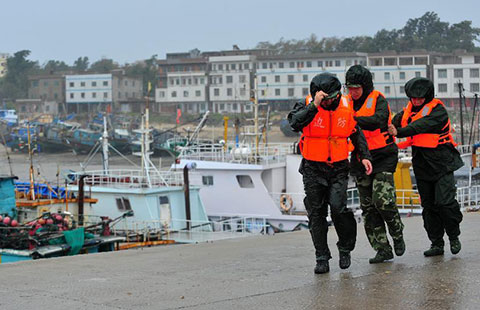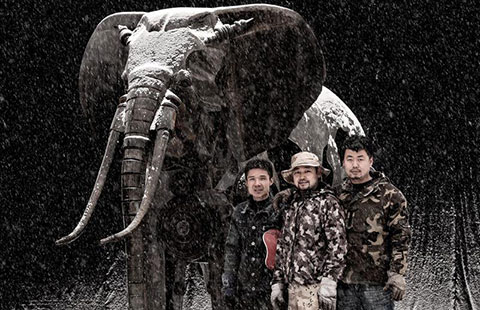

Medical workers from China made friends of people in Sierra Leone
|
Chinese medical workers spray insecticide to kill mosquitoes in November at the Sierra Leone-China Friendship Hospital in Freetown, the capital of Sierra Leone. Dai Xin / For China Daily |
In September, when the Sierra Leone-China Friendship Hospital was virtually deserted after the death of an Ebola patient, Li Jin and his colleagues transformed the hospital into a special unit for treating patients with the potentially deadly disease.
Over the following six months, Li and his 114 colleagues from China's 302 Military Hospital treated 773 patients, including 285 confirmed with Ebola, 51 percent of whom were cured.
In addition, they also provided training to more than 500 local doctors and nurses at the hospital in Freetown, the capital of Sierra Leone.
"We are very grateful for the medical teams sent by the Chinese army to help us fight Ebola," said Alex Kanu, president of the Sierra Leone-China Friendship Hospital. "They have provided us training and knowledge that we can use in the future."
Since the outbreak of Ebola in West Africa in February of last year, the Chinese army has sent 494 medical workers to Sierra Leone and Liberia to help governments fight Ebola, according to Tao Deping, a senior official with the People's Liberation Army general logistics department.
The army also provided 128 million yuan ($21 million) worth of health materials and other relief materials to West Africa, he said.
"I am so relieved to see all of us return safely, after so many hardships we had never imagined," Li, vice-president of China's 302 Military Hospital, said in March, when the last of the medical team returned to Beijing.
Li was a little upset when he received the order in early September to lead a 31-member medical team to Sierra Leone, as Ebola was spreading rapidly in West Africa.
"It was a virus we virtually knew nothing of. We did not know where it came from, or how it caused illness, and there were no vaccines or drugs for it. And the number of infections was increasing at an exponential rate," he said.
More challenges
By early September, more than 2,200 people in West Africa had died from Ebola, which had a fatality rate of up to 90 percent, according to a World Health Organization report. In Sierra Leone, dozens of Ebola patients died each day.
Although Li and his colleagues had anticipated all kinds of difficulties before setting out, they found more challenges facing them after arriving. In addition to treating patients, they had to train local medical staff almost from scratch.
"Most of them had limited knowledge and skills about prevention and control of infectious diseases, and some could not even wear a mask or wash their hands in the right way," he said.
They had to teach skills such as how to wear protective gowns, sterilize boots and give infusions to patients.
Thanks to the strenuous efforts, no cross-infection was found among patients or medical workers in the hospital, Li said.
Many of the medical workers sent by 302 Military Hospital had rich experience in fighting major infectious diseases in China, such as SARS in 2003, which prepared them to help people in Sierra Leone control and prevent Ebola, according to the hospital.
Medical assistance from the Chinese army also earned the friendship of locals, said Wang Yonghua, a doctor from Chengdu Military General Hospital who was in Liberia between January and March.
"At a party held in Monrovia to celebrate Spring Festival, two cured Ebola patients told me they were grateful for us, as Chinese doctors gave them second lives," she said.
Kuang Xiaowen and Yu Qiaobing contributed to this story.
wangxiaodong@chinadaily.com.cn













